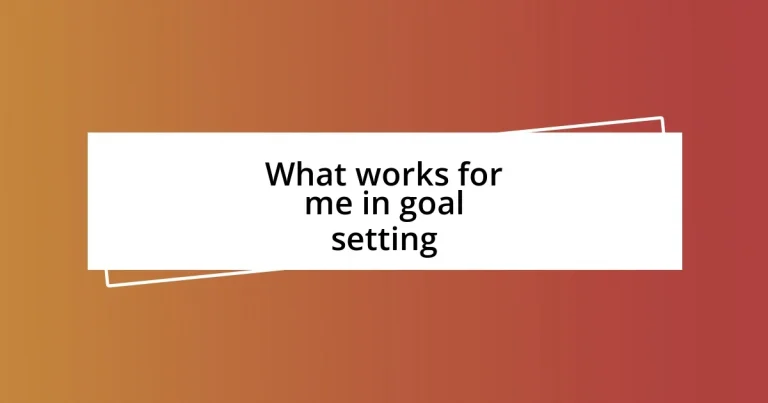Key takeaways:
- Setting personal goals fosters motivation and clarity, enabling individuals to align their aspirations with values and improve their focus.
- Utilizing techniques like SMART criteria, journaling, and visualization enhances goal-setting effectiveness and accountability.
- Celebrating achievements and reflecting on progress are crucial for maintaining motivation and fostering personal growth.
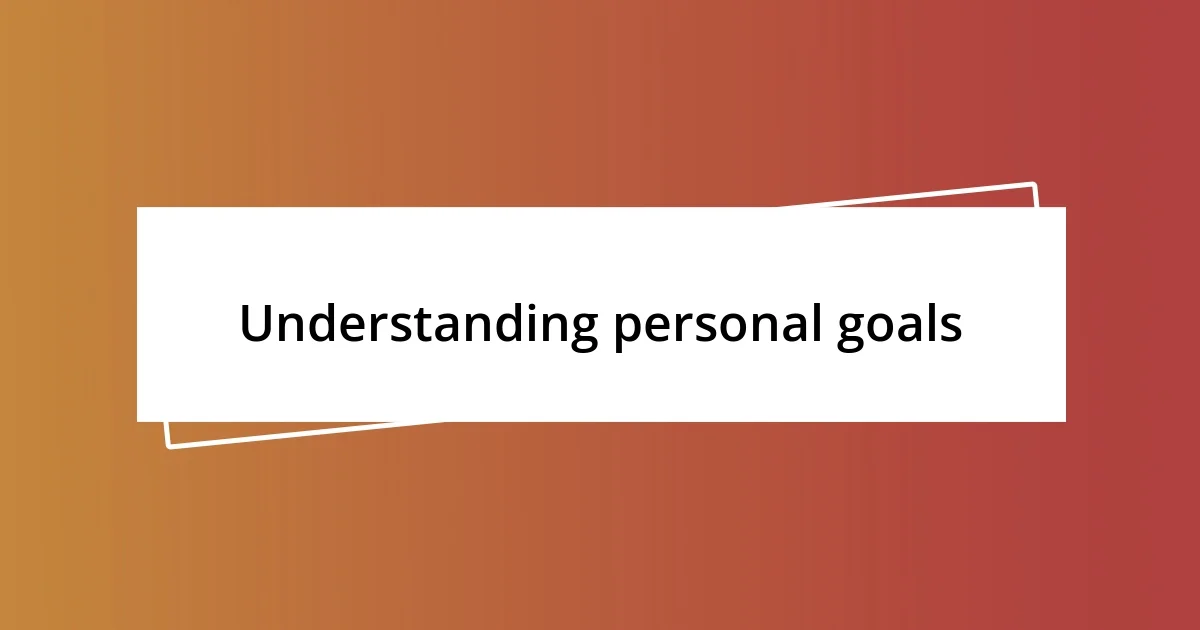
Understanding personal goals
Personal goals act as guiding stars in our lives, illuminating the path we choose to walk. Reflecting on my journey, I remember setting a goal to run a half marathon. At first, the idea seemed daunting, but breaking it down into manageable steps made all the difference.
Understanding personal goals isn’t just about the end result; it’s about the growth we experience along the way. I often find myself asking, “What do I truly want to achieve?” This introspection allows me to align my goals with my values, creating a more profound sense of purpose. Have you ever felt a surge of motivation when pursuing something meaningful? That’s the power of setting personal goals that resonate with us.
When I set a goal, I try to visualize not just the achievement, but the journey I’ll take to get there. For instance, when I aimed to improve my public speaking skills, envisioning the nervous excitement before stepping on stage encouraged me to tackle my fears. Understanding personal goals is deeply personal; it’s about reflecting on what truly matters to us and chasing after it with intent and passion.

Why goal setting matters
Setting goals is essential because it provides direction and focus in our lives. I remember the time I decided to save for a dream vacation. Without a clear target, I easily got sidetracked by daily expenses. However, once I defined my goal, I could prioritize saving over unnecessary purchases. That clarity sparked a sense of purpose that turned a simple desire into a concrete plan.
Here are a few reasons why goal setting matters:
- Increased Motivation: Achieving small goals fuels my desire to tackle bigger challenges.
- Clarity and Focus: With a defined goal, I can streamline my efforts and avoid distractions.
- Track Progress: Setting milestones allows me to celebrate achievements along the way, keeping the journey exciting.
- Personal Growth: Each time I set and pursue a goal, I learn something new about my abilities and limits.
- Enhanced Decision-Making: Goals guide me in making choices that align with my long-term aspirations.
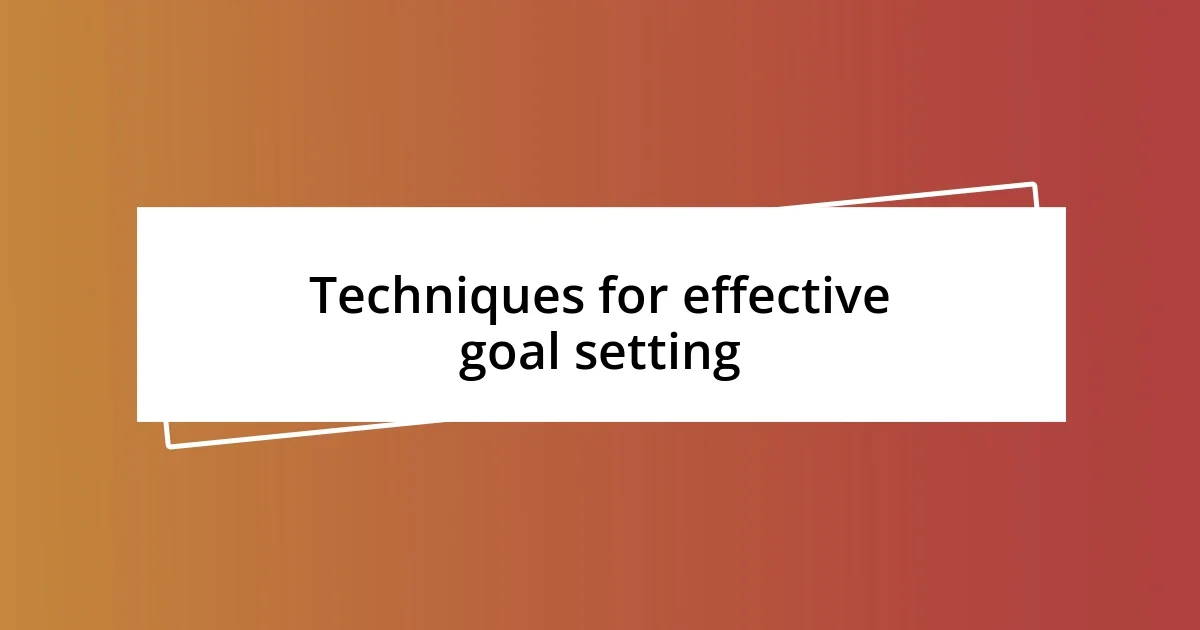
Techniques for effective goal setting
Setting effective goals requires utilizing various techniques that resonate with our individual styles. One method I’ve found incredibly useful is the SMART criteria: Specific, Measurable, Achievable, Relevant, and Time-bound. For instance, when I wanted to enhance my fitness level, I didn’t just say, “I want to get fit.” Instead, I specified, “I will run three times a week for 30 minutes and participate in a 5K within three months.” This targeted approach not only made my goal clearer but also kept me accountable.
Another technique I embrace is journaling. Writing down my goals creates a physical manifestation of my aspirations. I can vividly recall the satisfaction I experienced as I ticked off completed tasks, each one bringing me closer to my ultimate objective. This technique serves as a constant reminder and encouragement when the journey feels overwhelming. It’s interesting how reflecting on my journey through writing helps maintain enthusiasm and aligns my daily actions with long-term goals.
Finally, visualization techniques are a game-changer for me. Imagining the end result, such as picturing myself giving a successful presentation, helps cultivate the confidence needed to conquer my nerves. I’ve found that this blend of imagination and preparation can transform anxiety into excitement, making the goal feel more attainable.
| Technique | Description |
|---|---|
| SMART Goals | Focus on setting goals that are Specific, Measurable, Achievable, Relevant, and Time-bound for clarity and accountability. |
| Journaling | Write down goals and track progress, which allows for reflection and boosts motivation. |
| Visualization | Imagine achieving your goals to boost confidence and transform fears into positive anticipation. |
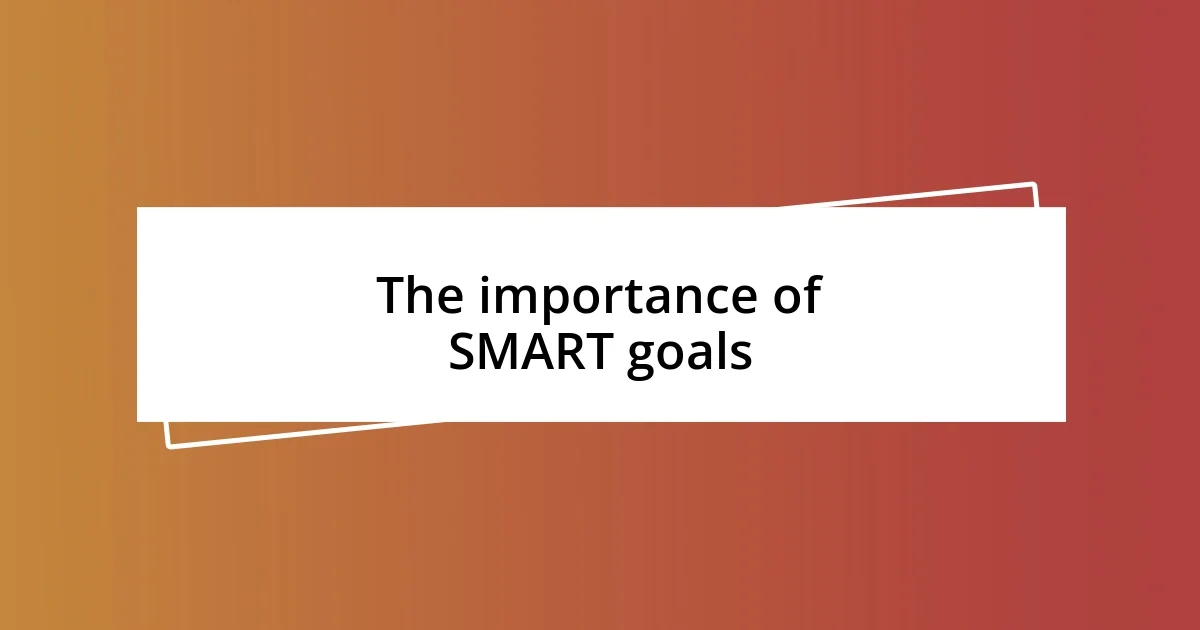
The importance of SMART goals
When I first started using SMART goals, I noticed a significant shift in how I approached my ambitions. For example, instead of vaguely aiming to “learn guitar,” I set a specific goal: “I will learn to play five songs on the guitar within two months.” This clarity not only made the process more attainable but ignited a passion for practice that I didn’t expect. Have you ever felt that rush of excitement when a goal comes into sharper focus? I certainly have, and it’s a powerful motivator.
The beauty of SMART goals lies in their measurable nature. Tracking progress becomes second nature, as I can easily identify how far I’ve come and what adjustments I need to make. Recently, while preparing for a work certification, I broke my goal into weekly milestones. Each week, I could see how my efforts were adding up, and truthfully, that sense of accomplishment kept me going even on tough days. Isn’t it amazing how small victories can transform our mindset and keep us engaged?
Additionally, setting realistic timelines within the SMART framework teaches me the value of balance. I learned this the hard way while juggling too many commitments. By refining my goals to include specific deadlines, I’ve stopped overwhelming myself and instead, created a roadmap that feels both challenging and achievable. Have you ever set a deadline and then noticed how it changes your sense of urgency? For me, it turned tasks that once felt burdensome into exciting challenges I was eager to tackle.
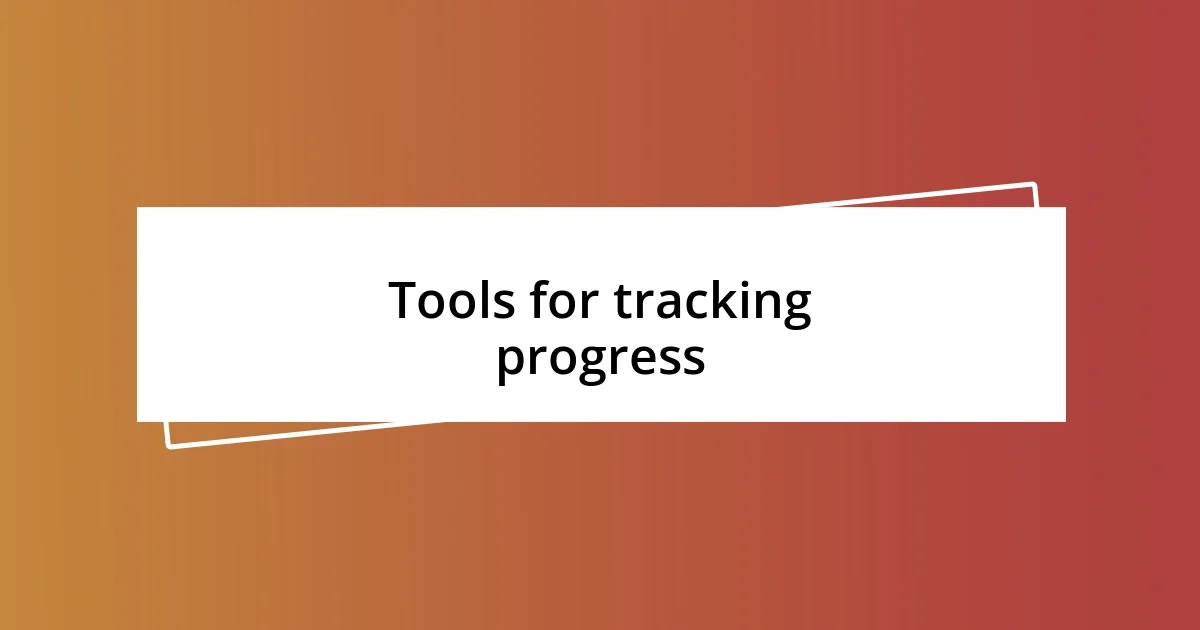
Tools for tracking progress
When it comes to tracking progress, I’ve found that digital tools can be incredibly effective. Apps like Todoist or Trello allow me to break down my goals into actionable tasks and prioritize them at a glance. Have you ever had that feeling of satisfaction when you check off an item on your to-do list? It’s that little boost of motivation that fuels me to keep going.
Another method that resonates with me is using a physical planner. I love the tactile sensation of writing things down and seeing my progress on paper. There’s something fulfilling about flipping through pages filled with tasks I’ve completed. I often find myself reflecting on my journey within those pages, celebrating not just the milestones but also the smaller victories that paved the way. How often do we overlook the importance of those incremental steps? They’re the heartbeat of progress.
Lastly, spreadsheets can be a hidden gem for simplicity in tracking. When I set my sights on a personal finance goal, I created a spreadsheet to monitor my savings each month. Watching those numbers grow not only kept me accountable but also provided a clear visual of my progress. Have you ever tried a simple chart to see your growth? It’s amazing how a visual representation can enhance motivation and provide clarity on what’s working and what might need adjusting.
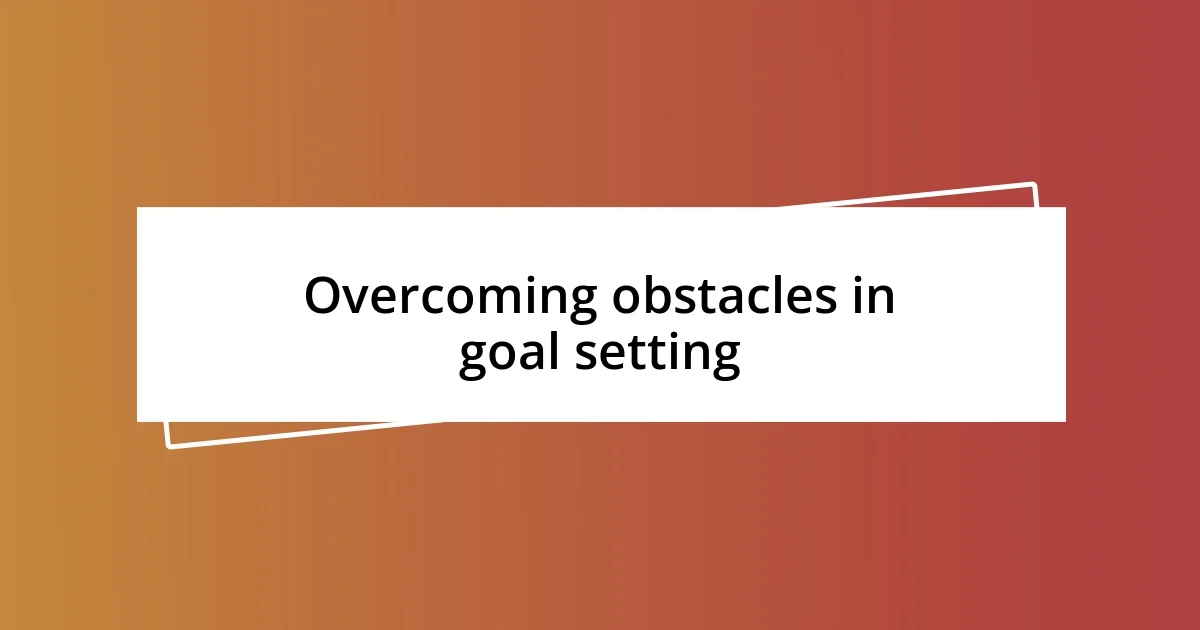
Overcoming obstacles in goal setting
When facing obstacles in goal setting, I’ve discovered the power of shifting my mindset. Instead of viewing setbacks as failures, I see them as opportunities for growth. For instance, when I struggled to keep up with my fitness goal due to a busy schedule, I realized that altering my approach was key. Have you ever had to reframe how you perceived a challenge? I found that embracing flexibility allowed me to adapt my workouts, turning the frustration into newfound creativity.
Another hurdle that often arises is self-doubt, which can be particularly paralyzing. I remember a time when I wanted to take on a public speaking role but faced crippling anxiety. Instead of letting that fear stand in my way, I took small steps—starting with practicing in front of friends. I realized that by sharing my worries, I not only found support but also gained confidence. When was the last time you faced a fear head-on? Acknowledging those feelings and tackling them incrementally made a world of difference for me.
In tackling obstacles, I also learned the importance of building a support system. When I aimed to launch my own blog, I sought out mentors who had walked a similar path. Their guidance could not have been more invaluable! Sharing struggles not only lightened the load but also provided practical insights that I couldn’t have imagined on my own. Have you ever leaned on someone during a tough time? Knowing I wasn’t alone made the process much more enjoyable and helped me forge ahead, turning obstacles into stepping stones toward my goals.
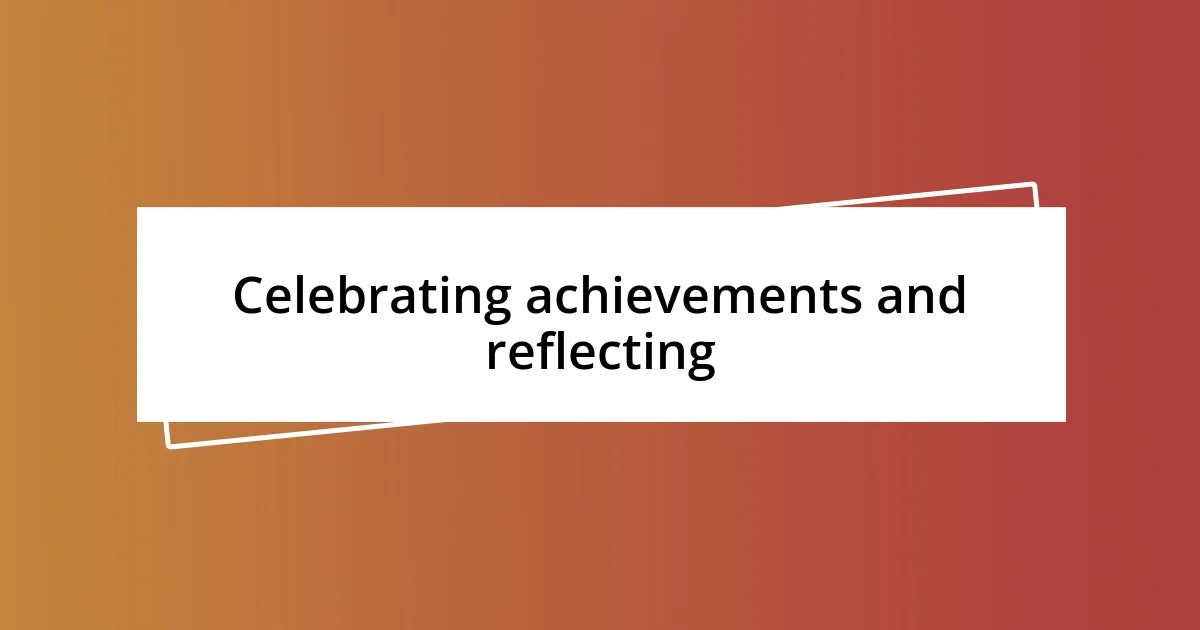
Celebrating achievements and reflecting
Celebrating achievements is essential in maintaining motivation and a sense of progress. I can’t count how many times I’ve reached a goal and simply set my sights on the next one without taking a moment to pause. I learned to change that by treating each victory, big or small, as a reason to celebrate. Whether it’s treating myself to a nice dinner or sharing my success with friends, those moments of recognition have reinforced my commitment. Have you ever noticed how a simple celebration boosts your mood and encourages you to tackle the next challenge?
Reflecting on my journey has become a critical practice, allowing me to appreciate the twists and turns along the way. After completing a significant project, I like to take time to journal my thoughts and feelings, retracing my steps. This reflection not only highlights what I did well but also sheds light on what I can improve next time. It’s fascinating how examining past experiences can shape future endeavors. Have you tried reflecting on your past successes? It’s incredible how much I learn about myself through this process, and it often sparks new ideas for my next set of goals.
Another practice that’s profoundly impacted me is sharing achievements with a close circle. I remember a time when I completed a challenging personal development course and invited friends over to celebrate. The joy in their reactions made my accomplishment feel even more significant. This shared happiness fosters a deeper connection and reinforces the importance of my journey. What about you—do you have someone with whom you share your successes? I’ve realized that celebrating together amplifies the experience and fosters a supportive environment that keeps us all moving forward.












